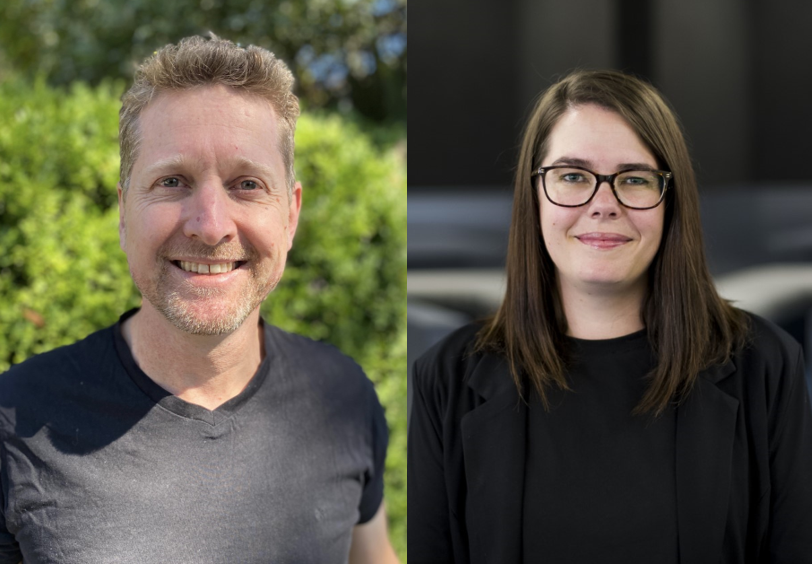Swinburne students driving innovative science research to market

Master of Entrepreneurship and Innovation students, Alistair and Stacey, used their entrepreneurial and business acumen to help Swinburne researchers accelerate the commercialisation of their research.
In summary
- Master of Entrepreneurship and Innovation students are teaming up with Swinburne scientists to turn scientific inventions into widely available products or services
- Students used their expertise to collaborate with Swinburne-led medical technology startup, NovaSense Biomedical, to consider and accelerate commercialisation pathways
- NovaSense Biomedical’s product, Cue Sleeve, is a motorised, wearable sleeve that provides motion guidance for people with vision impairment
Swinburne entrepreneurship students are helping turn cutting-edge scientific research and inventions into publicly available products and services that have real potential to transform lives.
A unit in the Master of Entrepreneurship and Innovation (MEI), Venture in Action, provides an opportunity for students to team up with leading Swinburne scientists to transform research into valuable products or services. At the same time, scientists can access the knowledge of entrepreneurs experienced in market-ready business models and products.
Innovative medical technologies
Computer Science and Software Engineering Senior Lecturer, Dr Chris McCarthy and biomedical engineer and Swinburne PhD student, Deepa Prabhu collaborated with two students to consider commercialisation pathways for Cue Sleeve – the first offering from their medical technology startup, NovaSense Biomedical.
Cue Sleeve, an outcome of Ms Prabhu’s PhD research, is a motorised, wearable sleeve that provides motion guidance for people with vision impairment. Built as a rehabilitation tool, it can also be used for general assistance in day-to-day lives.
Cue Sleeve was also a finalist in the Swinburne Venture Cup 2020, the university’s flagship pitching competition hosted by the Swinburne Innovation Precinct, where they pitched to win $20,000 in pre-seed funding for their startup.
Dr McCarthy was also awarded the MedTech Actuator Menzies Fellowship (valued at $70,000 each) for his work on Cue Sleeve.

Cue Sleeve is a motorised, wearable sleeve that provides motion guidance for people with vision impairment.
From research to market: accelerating the process
Dr McCarthy and Ms Prabhu were blown away by the results of working with the students, who are all established in their own careers.
“They put a tremendous amount of energy into the project and did a phenomenal job in accelerating our understanding of commercialisation,” says Ms Prabhu.
“The students opened our eyes to not only the potential of Cue Sleeve, but also the pathways to get to an international market,” says Dr McCarthy, who is also Ms Prabhu’s PhD supervisor.

Medical technology startup Cue Sleeve was born from Ms Prabhu’s biomedical engineering PhD research and was a finalist in Swinburne’s 2020 Venture Cup.
Stacey Lauricella, a senior manager for the financial services firm Pitcher Partners, is one of the students who worked on the Cue Sleeve project.
“The real beauty of this partnership was helping them move this concept into a reality and view it from a business lens,” says Ms Lauricella.
The students were required to consider a five-year income forecast for Cue Sleeve, which posed questions about the size of their actual target market, how to penetrate the market, revenue generation, production, staff considerations, and IT and infrastructure requirements.
“I believe we accelerated Deepa in her journey by two years through challenging her thought processes. For her to do it alone would be such an overwhelming journey.”
Ms Lauricella also emphasises the importance of providing commercialisation support to researchers in their entrepreneurial journey.
“There’s a huge gap that needs to be filled. Prior to this, there have been so many missed opportunities. Everyone needs to get involved in this because there are so many good ideas.”
The student experience
Student Alistair Chisholm also worked on the project and highlights the value of collaboration in an entrepreneurial environment.
“The project shed light on just how much collaborative work is required to shape a meaningful and investable value proposition,” says Mr Chisholm.
“It requires a commitment from all team members to remain open to learning and apply new concepts outside of their normal comfort zone.”
-
Media Enquiries
Related articles
-

- Technology
- Science
- Engineering
Victorian students drive green energy transition through international hydrogen competition
Swinburne’s KIOSC, in collaboration with Horizon Educational and Gippsland Tech School, co-hosted the Hydrogen Grand Prix in Melbourne.Friday 26 July 2024 -

- Technology
- Health
New MedTechVic prototypes to transform everyday lives of people with a disability
Swinburne’s MedTechVic has revealed three new prototypes designed through the joint Health-led Manufacturing Innovation Program, in partnership with the Australian Medtech Manufacturing Centre and Safer Care Victoria
Friday 19 July 2024 -

- Science
Skin, scales and fish tails: using collagen to turn fish guts into gold
New research from Swinburne could transform the sector by converting high value collagen proteins from seafood by-products into cosmetics, food, and pharmaceuticals.
Tuesday 02 July 2024 -

- Science
- Engineering
Submarines in the future could self-identify cracks and self-heal thanks to Swinburne researcher
Thanks to the work of Dr Nisa Salim from Swinburne University of Technology’s School of Engineering, future submarines could self-identify microcracks and self-heal using a new kind of carbon fibre reinforced polymer composites.
Monday 17 June 2024 -

- Business
- Technology
Swinburne’s Luminate Pitch Night 2024 advances innovative ideas for a better world
Swinburne’s 2024 Luminate Pitch Night showcased market-ready ideas from 10 founders
Wednesday 12 June 2024

